Efficient Orchestration Methods in Air Computing
Feb. 15, 2022 - Present
There is an ever-growing race between what novel applications demand from the infrastructure and what the continuous technological breakthroughs bring in. Especially after the proliferation of smart devices and diverse IoT requirements, we observe the dominance of cutting-edge applications with ever-increased user expectations in terms of mobility, pervasiveness, and real-time response. Over the years, to meet the requirements of those applications, cloud computing provides the necessary capacity for computation, while edge computing ensures low latency. However, these two essential solutions would be insufficient for the next-generation applications since computational and communicational bottlenecks are inevitable due to the highly dynamic load. Therefore, a 3D networking structure using different air layers including Low Altitude Platforms, High Altitude Platforms, and Low Earth Orbits in a harmonized manner for both urban and rural areas should be applied to satisfy the requirements of the dynamic environment. In this perspective, we put forward a novel, next-generation paradigm called Air Computing that presents a dynamic, responsive, and high-resolution computation and communication environment for all spectrum of applications. This research is the main research subject for my PhD studies.
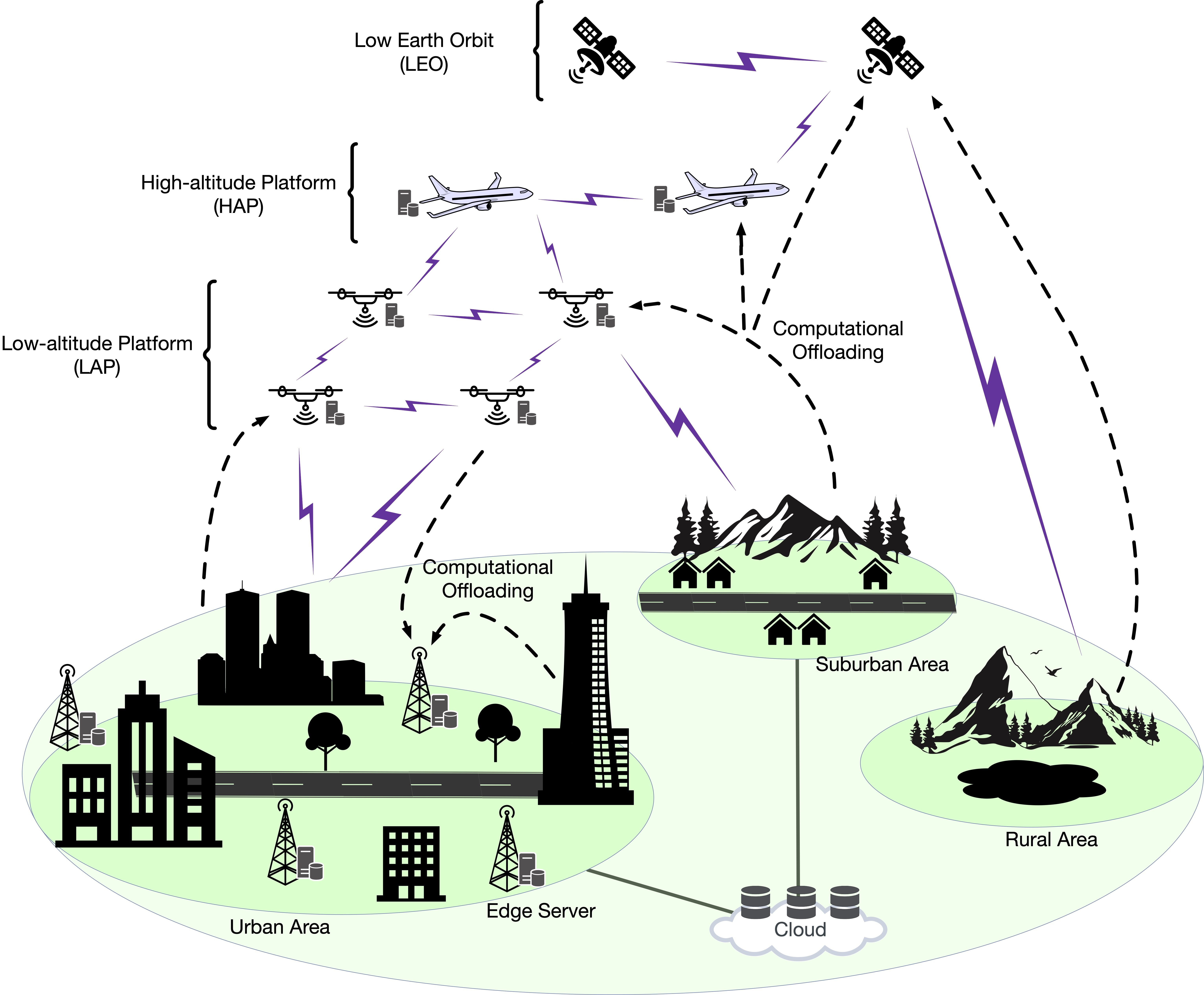
DeepEdge: A Deep Reinforcement Learning based Task Orchestrator for Edge Computing
March 10, 2020 - June 15, 2021
The improvements in the edge computing technology pave the road for diversified applications that demand real-time interaction. However, due to the mobility of the end-users and the dynamic edge environment, it becomes challenging to handle the task offloading with high performance. Moreover, since each application in mobile devices has different characteristics, a task orchestrator must be adaptive and have the ability to learn the dynamics of the environment. For this purpose, we develop a deep reinforcement learning based task orchestrator, DeepEdge, which learns to meet different task requirements without needing human interaction even under the heavily-loaded stochastic network conditions in terms of mobile users and applications. Given the dynamic offloading requests and time-varying communication conditions, we successfully model the problem as a Markov process and then apply the Double Deep Q-Network (DDQN) algorithm to implement DeepEdge. To evaluate the robustness of DeepEdge, we experiment with four different applications including image rendering, infotainment, pervasive health, and augmented reality in the network under various loads. Furthermore, we compare the performance of our agent with the four different task offloading approaches in the literature. Our results show that DeepEdge outperforms its competitors in terms of the percentage of satisfactorily completed tasks.
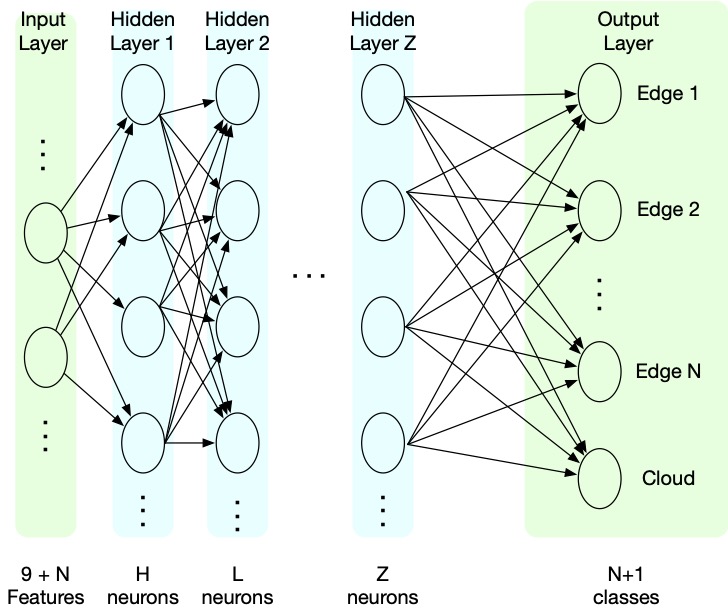
Distributed Data Processing and Applications for Mobile Edge Computing
Aug. 1, 2017 - June 1, 2018
Considering the tremendous amount of data emerging by mobile devices each day, Mobile Edge Computing (MEC) solutions would have critical importance. To this end, this research project aimed at finding possible effective solutions. This project was funded by Netas.

Service Management on Multitier IT Architecture
Jan. 1, 2017 - Jan. 1, 2019
The goal of this project was to bring cloudlets providing service with minimal latency, and cloud servers, which can service when there is a need for high processing power while latency is not so significant, together in a multi-tier architecture. This project was funded by Bogazici University Scientific Research Projects (BAP).
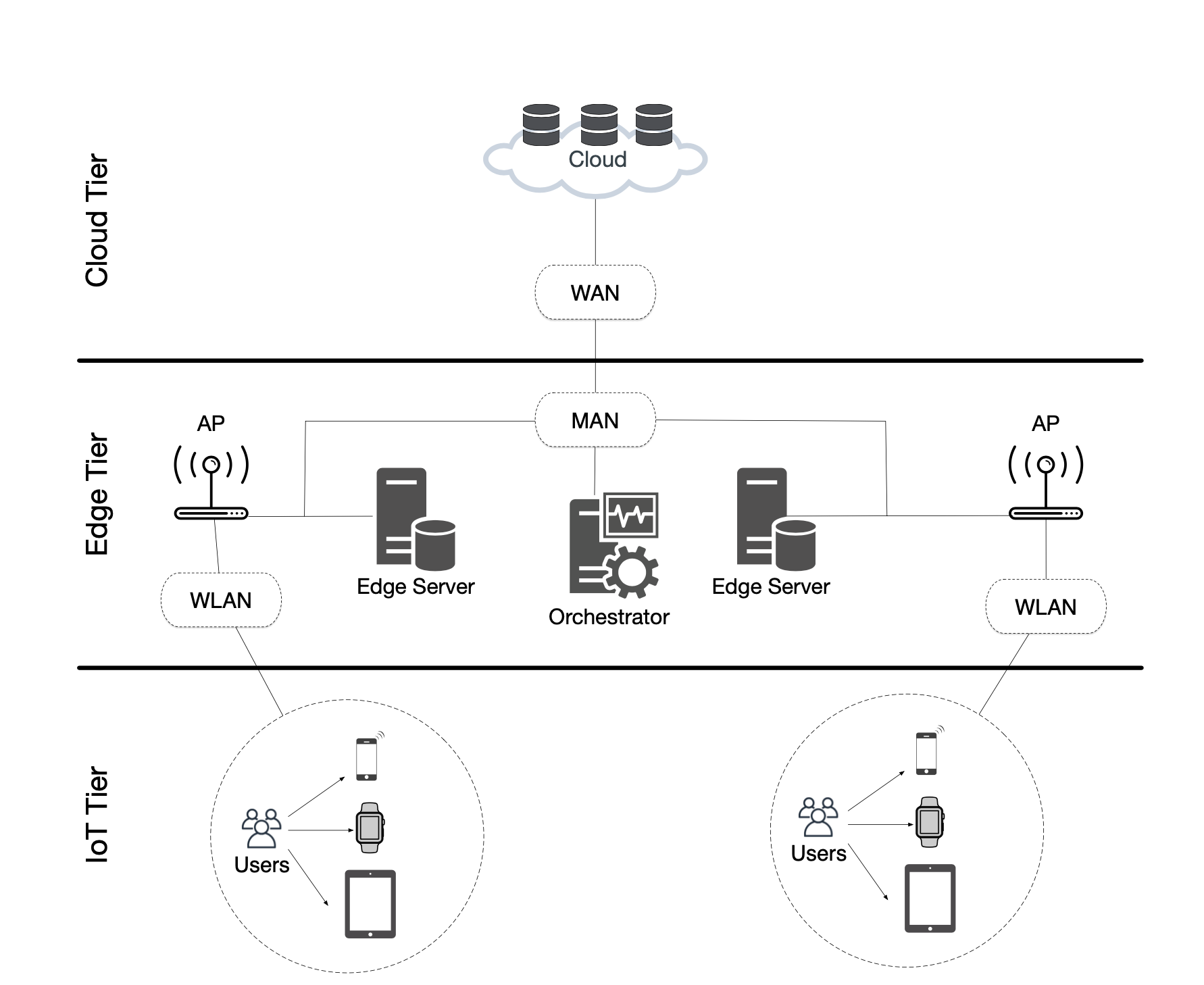
Fault Tolerance in SDN Data Plane
Sept. 15, 2016 - June 15, 2019
Failures in networks result in service disruptions which may cause deteriorated Quality of Service (QoS) for the end-users. Since SDN is becoming the mainstream paradigm for networks, the implementation of a robust fault tolerance scheme for SDN-based networks is crucial. Moreover, that robust fault tolerance scheme should ensure the stability for QoS and Quality of Experience (QoE). To this end, we investigated
-
A novel dynamic protection method considering the quality of alternative paths.
-
How video quality and thus QoE would fluctuate when a failure occurs.
-
The effect of the detection of the congestion in the link layer operating Bidirectional Forwarding Detection (BFD) rather than the application layer.
-
The impact of BFD intervals on the QoE parameters along with the video segment size to come up with a feasible operational range where the fault tolerance approach is beneficial for the congestion case.
Note that this study was my thesis subject in my MS studies.
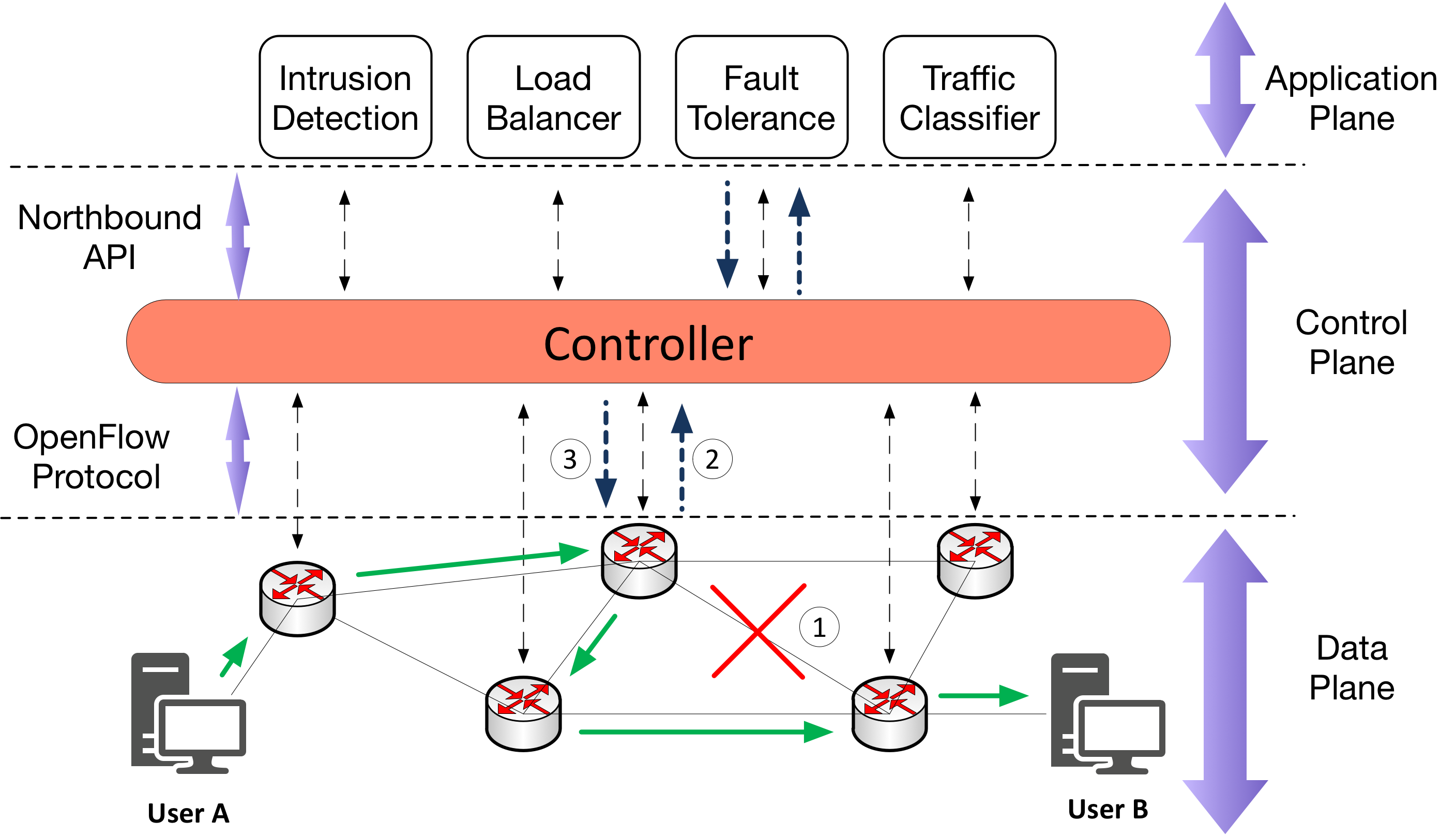
DeepEdge: A Deep Reinforcement Learning based Task Orchestrator for Edge Computing
March 10, 2020 - June 15, 2021
The improvements in the edge computing technology pave the road for diversified applications that demand real-time interaction. However, due to the mobility of the end-users and the dynamic edge environment, it becomes challenging to handle the task offloading with high performance. Moreover, since each application in mobile devices has different characteristics, a task orchestrator must be adaptive and have the ability to learn the dynamics of the environment. For this purpose, we develop a deep reinforcement learning based task orchestrator, DeepEdge, which learns to meet different task requirements without needing human interaction even under the heavily-loaded stochastic network conditions in terms of mobile users and applications. Given the dynamic offloading requests and time-varying communication conditions, we successfully model the problem as a Markov process and then apply the Double Deep Q-Network (DDQN) algorithm to implement DeepEdge. To evaluate the robustness of DeepEdge, we experiment with four different applications including image rendering, infotainment, pervasive health, and augmented reality in the network under various loads. Furthermore, we compare the performance of our agent with the four different task offloading approaches in the literature. Our results show that DeepEdge outperforms its competitors in terms of the percentage of satisfactorily completed tasks.

Advanced Threat Detection Using Machine Learning Techniques
July 1, 2015 - July 1, 2016
The project aimed at detecting and preventing Intrusion and Advanced Persistent Thread (APT) attacks via manifesting anomalies in network flows and system logs using machine learning algorithms. DeterLab Testbed was used as a development and test platform for the various work packages of the project. Moreover, it was funded by The Scientific and Technological Research Council of Turkey (TUBITAK).

Network Traffic Classification Using Machine Learning Techniques
Sept. 15, 2014 - June 15, 2015
Recent developments on the Internet have led to increase the importance of network traffic classification. Classification of large-scale network traffic can provide much important information for network management, QoS and network security. In this study, the influence of different network speeds to accuracy was evaluated and a comparison between packet-based and time-based approaches was performed.

Activity Recognition on Smartphones
Sept. 15, 2013 - June 15, 2014
Great hardware and software capabilities of mobile devices allow us to research new scientific fields. Activity recognition is one of the main research areas for smartphones. Built-in sensors of a standard smartphone, such as accelerometer, magnetometer, gyroscope, enable us to predict the daily activities of a person. However, continuous samplings from each sensor increase the CPU utilization and cause the battery to die sooner. In this study, we focused on the window sizes and the sampling rates in order to observe how they affect to the accuracy and CPU utilization.
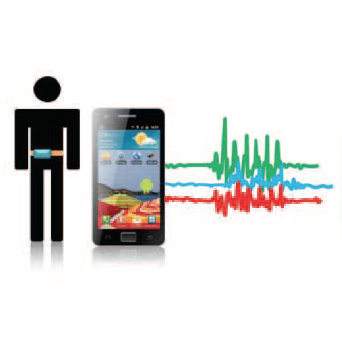
Fault Tolerance in SDN Data Plane
Sept. 15, 2016 - June 15, 2019
Failures in networks result in service disruptions which may cause deteriorated Quality of Service (QoS) for the end-users. Since SDN is becoming the mainstream paradigm for networks, the implementation of a robust fault tolerance scheme for SDN-based networks is crucial. Moreover, that robust fault tolerance scheme should ensure the stability for QoS and Quality of Experience (QoE). To this end, we investigated
-
A novel dynamic protection method considering the quality of alternative paths.
-
How video quality and thus QoE would fluctuate when a failure occurs.
-
The effect of the detection of the congestion in the link layer operating Bidirectional Forwarding Detection (BFD) rather than the application layer.
-
The impact of BFD intervals on the QoE parameters along with the video segment size to come up with a feasible operational range where the fault tolerance approach is beneficial for the congestion case.
Note that this study was my thesis subject in my MS studies.

DeepEdge: A Deep Reinforcement Learning based Task Orchestrator for Edge Computing
March 10, 2020 - June 15, 2021
The improvements in the edge computing technology pave the road for diversified applications that demand real-time interaction. However, due to the mobility of the end-users and the dynamic edge environment, it becomes challenging to handle the task offloading with high performance. Moreover, since each application in mobile devices has different characteristics, a task orchestrator must be adaptive and have the ability to learn the dynamics of the environment. For this purpose, we develop a deep reinforcement learning based task orchestrator, DeepEdge, which learns to meet different task requirements without needing human interaction even under the heavily-loaded stochastic network conditions in terms of mobile users and applications. Given the dynamic offloading requests and time-varying communication conditions, we successfully model the problem as a Markov process and then apply the Double Deep Q-Network (DDQN) algorithm to implement DeepEdge. To evaluate the robustness of DeepEdge, we experiment with four different applications including image rendering, infotainment, pervasive health, and augmented reality in the network under various loads. Furthermore, we compare the performance of our agent with the four different task offloading approaches in the literature. Our results show that DeepEdge outperforms its competitors in terms of the percentage of satisfactorily completed tasks.

OFDMA Scheduler Development for IEEE 802.11ax Dual Band Wireless Access Point with MU-MAC Frame Support
March 1, 2019 - March 1, 2020
This project aimed at implementing an MU MAC OFDMA scheduler on an AP that supports IEEE 802.11ax standard (Wifi 6). The expectation from the scheduler was to consider the fairness and efficiency between HE STAs regarding their uplink and downlink traffic. The project was funded by AirTies Wireless Networks.
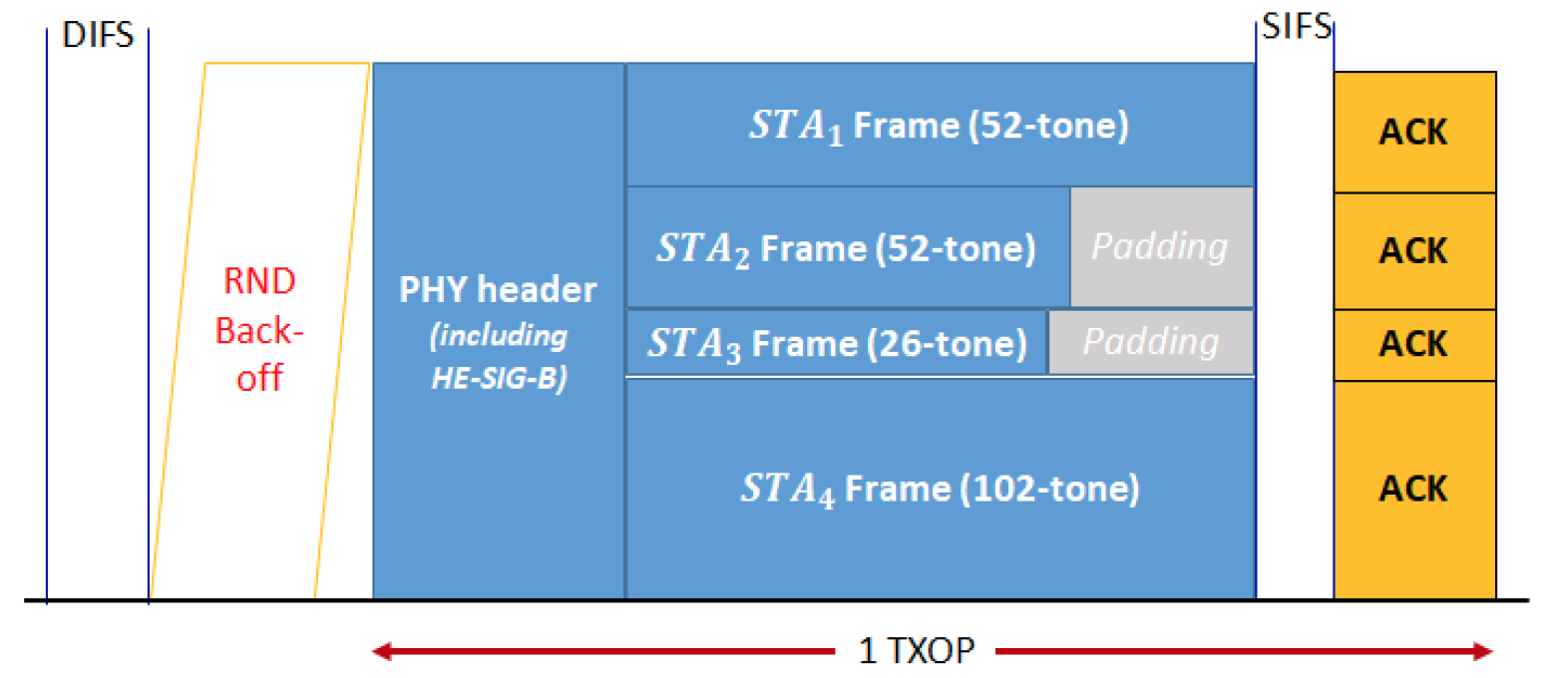
Fault Tolerance in SDN Data Plane
Sept. 15, 2016 - June 15, 2019
Failures in networks result in service disruptions which may cause deteriorated Quality of Service (QoS) for the end-users. Since SDN is becoming the mainstream paradigm for networks, the implementation of a robust fault tolerance scheme for SDN-based networks is crucial. Moreover, that robust fault tolerance scheme should ensure the stability for QoS and Quality of Experience (QoE). To this end, we investigated
-
A novel dynamic protection method considering the quality of alternative paths.
-
How video quality and thus QoE would fluctuate when a failure occurs.
-
The effect of the detection of the congestion in the link layer operating Bidirectional Forwarding Detection (BFD) rather than the application layer.
-
The impact of BFD intervals on the QoE parameters along with the video segment size to come up with a feasible operational range where the fault tolerance approach is beneficial for the congestion case.
Note that this study was my thesis subject in my MS studies.

Network Traffic Classification Using Machine Learning Techniques
Sept. 15, 2014 - June 15, 2015
Recent developments on the Internet have led to increase the importance of network traffic classification. Classification of large-scale network traffic can provide much important information for network management, QoS and network security. In this study, the influence of different network speeds to accuracy was evaluated and a comparison between packet-based and time-based approaches was performed.

OFDMA Scheduler Development for IEEE 802.11ax Dual Band Wireless Access Point with MU-MAC Frame Support
March 1, 2019 - March 1, 2020
This project aimed at implementing an MU MAC OFDMA scheduler on an AP that supports IEEE 802.11ax standard (Wifi 6). The expectation from the scheduler was to consider the fairness and efficiency between HE STAs regarding their uplink and downlink traffic. The project was funded by AirTies Wireless Networks.
